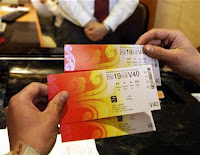 Many are called; few are chosen. For each athlete who makes it to compete in the Olympics, thousands of others never have that dream realized. But if you can compete in another country's uniform, all the more chances you have of marching in the opening ceremony and possibly even snaring a medal.
Many are called; few are chosen. For each athlete who makes it to compete in the Olympics, thousands of others never have that dream realized. But if you can compete in another country's uniform, all the more chances you have of marching in the opening ceremony and possibly even snaring a medal. That's the unique opportunity at which American basketball player Becky Hammon is leaping. Hammon, a popular WNBA player for the San Antonio Silver Stars in the U.S. last season who was the runner-up for the league's most valuable player, became a naturalized Russian citizen last year and will be wearing the colors of Moscow in the Olympic competition this August. ESPN notes her decision is "controversial" to say the least. But it's been an intriguing journey for the 31-year-old who appears to have been snubbed by USA Basketball. She wasn't among those chosen to be among those eligible to try out for the U.S. Olympic team, so she signed on with CSKA Moscow in a deal that would allow her to compete for a spot on Russia's Olympic team. Subsequently Hammon was invited to try out for the U.S. team, "but she said contractual obligations with CSKA left her unable to attend," ESPN says. She and her agent later tried to clarify her position, but "they came away with the impression that she wasn't in serious contention to make the team. So Hammon took her Olympic dream elsewhere."
She will be joined on the team by another American, J.R. Bucknell. "The jersey that I wear has never made me who I was. It has nothing to do with what's written on my heart," Hammon told ESPN.com. "Will I be playing for Russia? Yes. But I'm absolutely 100 percent still an American. I love our country. I love what we stand for. This is an opportunity to fulfill my dream of playing in the Olympics."
Many athletes switch uniforms, if not allegiances, either as the only way to make it to the Games, because teams lack enough qualified members, or because of any number of disputes with coaches an National Olympic Committees. At the 1988 Seoul Olympics, I met with some members of China's swimming delegation which included a competitor from Turkey -- apparently giving the Chinese some needed depth. I covered World Cup skiing in Japan and interviewed Marc Ghiradelli, a consummate skier in all disciplines from Austria ... though he competed for Luxembourg over coaching disagreements.




